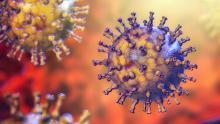Immunizations: Chickenpox (Varicella)
Chickenpox is caused by the varicella-zoster virus.
Varicella-zoster is part of the herpes family of viruses. It commonly causes an itchy rash on the skin with blisters, fever, headache, loss of appetite, and tiredness. Chickenpox can be serious, especially for babies, adolescents, adults, pregnant women, and people with a lowered ability to fight germs and sickness (weakened immune system).
Chickenpox easily spreads from person to person.
A vaccine can prevent chickenpox
The best way to prevent chickenpox is to get the vaccine!
Learn more about the chickenpox vaccine
About chickenpox
You can easily catch chickenpox by:
- Having contact with the virus particles from an infected person’s rash.
- Breathing in droplets when an infected person breathes or talks.
You also can get chickenpox from people who have shingles, which is caused by the same varicella-zoster virus.
A person who has chickenpox can spread the disease one to two days before the rash begins. They also can spread the virus up to seven days later. They are contagious until all their chickenpox blisters heal and form into scabs. Vaccinated people who get chickenpox may develop blisters that don’t scab. These people are considered contagious until no new blisters have appeared for 24 hours.
"Chickenpox parties"—Don't take the chance
Chickenpox can be serious. It can lead to severe complications such swelling of the brain, known as encephalitis, and death, even in healthy children. Before there was a vaccine for chickenpox, 1–2 out of every 1000 people who got chickenpox would be hospitalized.
In the past, some parents held “chickenpox parties” to expose their unvaccinated children to a child with chickenpox in hopes that they would get the disease.
The Wisconsin Department of Health Services (DHS) strongly discourages these events. There is no way to tell in advance how severe your child’s symptoms will be. It’s not worth taking the chance of exposing your child to someone with the disease. The best way to protect infants and children against chickenpox is to get them vaccinated.
Symptoms of the chickenpox virus include:
- Itchy rash with blisters.
- Tiredness.
- Loss of appetite.
- Headache.
- Fever.
The rash might first appear on the stomach, back, or face. It can spread over the entire body.
Chickenpox can be serious, especially for babies, adolescents, adults, pregnant women, and people with a lowered ability to fight germs and sickness (weakened immune system).
Serious complications from chickenpox include:
- Bacterial infections of the skin and soft tissues in children, including Group A streptococcal infections.
- Infection of the lungs (pneumonia).
- Infection or swelling of the brain (encephalitis, cerebellar ataxia).
- Bleeding problems (hemorrhagic complications).
- Bloodstream infections (sepsis).
- Dehydration.
Chickenpox also can cause death. Deaths are very rare now because many people are protected by the vaccine. However, some deaths from chickenpox continue to occur in healthy, unvaccinated children and adults.
Call your doctor or local health department if you have chickenpox.
Treatment for chickenpox focuses on:
- Relieving symptoms.
- Preventing skin infections.
Learn more from the CDC (Centers for Disease Control and Prevention) about prevention and treatment, including when to call the doctor.
A vaccine is your best protection against catching chickenpox. The CDC recommends two doses of the chickenpox (varicella) vaccine for:
- Children.
- Adolescents.
- Adults who never had chickenpox and were never vaccinated.
Children usually receive the first dose at age 12–15 months, and the second dose at age 4–6 years. Sometimes it’s combined with other vaccines to prevent measles, mumps, rubella, and chickenpox in a single shot, known as MMRV.
Chickenpox vaccine is very safe and effective at preventing the disease. Most people who get the vaccine won’t get chickenpox. If a vaccinated person does get chickenpox, the symptoms are usually milder with fewer or no blisters (they may have just red spots) and mild or no fever.
The chickenpox (varicella) vaccine prevents almost all cases of severe illness. Since the chickenpox vaccination program began in the United States, there has been over 90% decrease in chickenpox cases, hospitalizations, and deaths.
Find out if you and your children are up to date on vaccines to prevent chickenpox. Check our Wisconsin Department of Health Services (DHS) Wisconsin Immunization Registry.
If you’re worried about cost, your family may be eligible for free vaccines. Read about our Vaccines For Children and Vaccines For Adults programs.
Just for health care providers
Chickenpox is a communicable disease. Health care providers must report cases of chickenpox.
Chickenpox is a Wisconsin Disease Surveillance Category II disease.
Report a recognized case to the patient’s local public health department. Within 72 hours, submit a case report through one of the following:
- Wisconsin Electronic Disease Surveillance System (WEDSS)
- Mail or fax—Acute and Communicable Disease Case Report, F44151 (Word)
Read more about required disease reporting in Wisconsin.
Case reporting and public health guidelines
- Varicella, Communicable Disease Case Reporting and Investigation Protocol EpiNet, P-01980 (PDF): Varicella case reporting and investigation protocol for health professionals
- CDC recommendation from the Advisory Committee on Immunization Practices (ACIP)—Varicella ACIP Vaccine Recommendations
- DHS Surveillance Guidance—(in revision)
- DHS Division of Public Health Surveillance and Control Guidelines are currently in revision as of June 25,2024.
- In the meantime, refer to CDC’s guidance on varicella.
- For questions contact Stacey Moyer at Stacey.Moyer@dhs.wisconsin.gov or Sarah Born at Sarah.Born2@dhs.wisconsin.gov
- Wisconsin State Library of Hygiene—Clinical Testing Reference Manual

